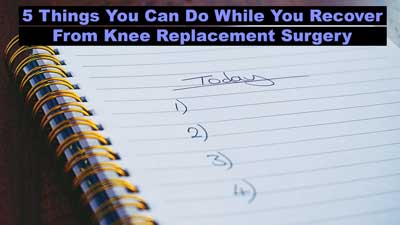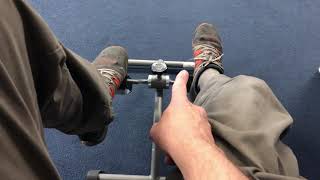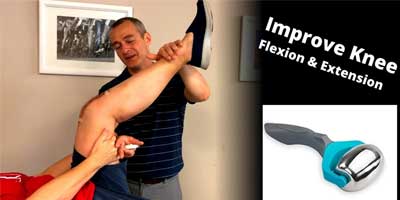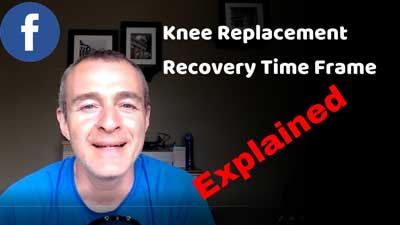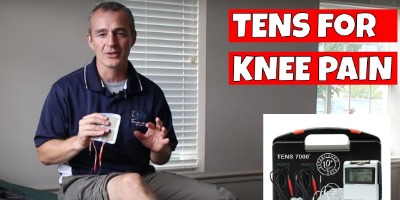Total Knee Replacement Pre Surgery Online Class
This total knee replacement class is 100% online, and totally FREE. In this three part class you will learn what to do 6-weeks before your surgery, the day of surgery, and 12-weeks after surgery.
* Class Dates To Be Announced
FREE Online Knee Replacement Pre-Surgical Class
In this video I share the first part of a three part class on preparing for your knee replacement surgery.
This portion of the class discusses pre-surgical considerations.
Watch time is 17:12 minutes.
What should I be doing 6-weeks before my knee replacement surgery?
There is lots to do before surgery. In this video you will hear some of the often forgotten parts of the pre-surgical plan.
What should I be doing the day of my knee replacement surgery?
The day of knee surgery you will need to follow you surgical teams recommendations.
Recommendations will vary slightly but be sure to utilize checklists to reduce the chances of forgetting any instructions.
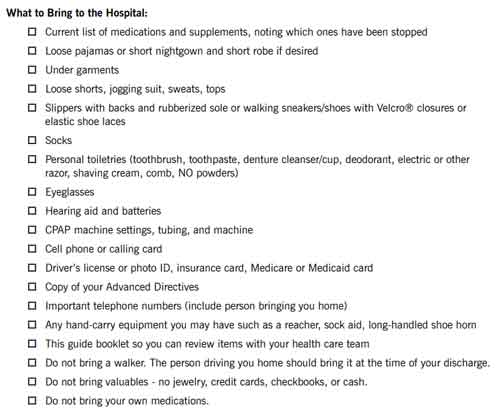
What can I expect during the first 12 weeks after surgery?
Immediately after surgery a physical therapist will help you stand and walk around your recovery room.
If surgery was performed in an outpatient surgery center you will return home the same day. Some patients will stay in the hospital for a short stay or transitioned to a skilled nursing facility if it is not safe to return home.
Therapy will begin the day of surgery and continue for an average of 6 to 12 weeks.
Most patients in the US will us a walker for the first few days then transition to a cane before walking independently without an assistive device.
Physical therapy may start in the home or skilled nursing facility before transitioning to an outpatient clinic or having a mobile therapist perform outpatient therapy in the patient's home.
Checklists
What to Bring to the Hospital on the Day of Your Knee Replacement:
Current list of medications and supplements, noting which ones have been stopped
Loose pajamas or short nightgown and short robe if desired
Under garments
Loose shorts, jogging suit, sweats, tops
Slippers with backs and rubberized sole or walking sneakers/shoes with Velcro® closures or elastic shoe laces
Socks
Personal toiletries (toothbrush, toothpaste, denture cleanser/cup, deodorant, electric or other razor, shaving cream, comb, NO powders)
Eyeglasses
Hearing aid and batteries
CPAP machine settings, tubing, and machine
Cell phone or calling card
Driver’s license or photo ID, insurance card, Medicare or Medicaid card
Copy of your Advanced Directives
Important telephone numbers (include person bringing you home)
Any hand-carry equipment you may have such as a reacher, sock aid, long-handled shoe horn
This guide booklet so you can review items with your health care team
Do not bring a walker. The person driving you home should bring it at the time of your discharge.
Do not bring valuables - no jewelry, credit cards, checkbooks, or cash.
Do not bring your own medications.
To improve my health before surgery:
I quit smoking to improve healing and reduce the risk of infection after surgery.
I had a dental check-up to make sure all my dental needs are taken care of before surgery.
I received a flu vaccination (if during flu season -- October through March).
I am eating lightly the week before my surgery to help reduce the risk of constipation.
I have increased fluids and fiber in my diet as well.
I had my diabetes checked, and it is under control (if applicable).
Things to do before surgery:
I have verified with my insurance company that I have coverage for my surgery.
I have attended the total joint replacement education class.
I have received my pre-admission testing schedule. If I have not received my schedule with in two weeks before my surgery, I will contact the surgery scheduling office.
I have completed all lab work requested from my surgeon’s office.
I will call my Specialty Care Coordinator if I have questions or concerns about my surgery.
I have talked to my Specialty Care Coordinator or surgeon about discharge options.
I have completed a Living Will or Health Care Power-of-Attorney to have on file in my chart.
I have not shaved my legs 3 days before my surgery.
I have arranged for someone to drive me home when I’m discharged from the hospital.
I have arranged for someone to drive me to my follow-up appointments.
More Blog Posts ...
Sleeping After Knee Replacement – 3 Best Positions
Finding a comfortable sleeping position after a knee replacement can be challenging. The most common advice is to sleep flat on your back with your surgical knee straight and elevated above your heart. To achieve this, many surgeons recommend propping a pillow under...
Best Orthopedic Doctor in Fairfield Ohio
Meet Dr. James Doug Abbott, MD an orthopedic surgeon who specializes in knee replacement surgery as well as other preventative knee care. In this interview Dr. Abbott, MD and Anthony Maritato, PT discuss trends in knee replacement surgery, jogging after knee...
5 Things to do While Recovering from Knee Replacement
Learning a new skill or hobby is a great way to pass the time while recovering from knee replacement surgery.
BEST Pedal Exerciser After Knee Replacement in 2021
A pedal exerciser is a perfect solution for anyone that has had total knee replacement surgery. This exercise bike is great because it is lightweight, inexpensive, and versatile. Below are videos and recommendations showing you how to use this mini-cycle for both...
Improve Range of Motion and Reduce Swelling After A Total Knee Replacement
To learn how to improve range of motion while reducing the swelling in your knee after a total knee replacement READ MORE>
Preparing for a Knee Replacement the EASY Way
Step 1 – Take a pre-operative knee replacement class. Step 2 – Schedule a pre-operative physical therapy evaluation. Step 3 – Create a battle plan for your recovery. Learn how to achieve each of these steps in this article.
Total Knee Replacement Recovery Time Frame
The first 48 hours after knee replacement surgery your top priority is pain management and rest. Days 3-10 focus on range of motion and walking. Next…
How Soon After Knee Replacement Can I Use A TENS Unit
TENS is a safe and effective pain control strategy used within the first 24-hours following knee replacement surgery. This post will review several studies discussing the use of TENS to reduce pain without opioid use.
7 Stretching & Strengthening Exercises for Frozen Shoulder
I review the 7 Stretches and Strengthening exercises for frozen shoulder (adhesive capsulitis) originally shared by Harvard Health Publishing
Is It Safe To Jump Rope After A Total Knee Replacement
Jump rope may be a great precursor to running activities after a total knee replacement. Jump rope allows


